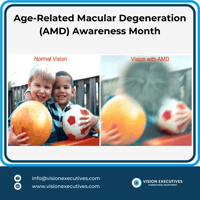📢 February is Age-Related Macular Degeneration Awareness Month 👁️ Age-Related Macular...
𝐕𝐢𝐬𝐢𝐨𝐧 𝐈𝐦𝐩𝐚𝐢𝐫𝐦𝐞𝐧𝐭 𝐋𝐢𝐧𝐤𝐞𝐝 𝐭𝐨 𝐎𝐧𝐞 𝐢𝐧 𝐅𝐢𝐯𝐞 #𝐃𝐞𝐦𝐞𝐧𝐭𝐢𝐚 𝐂𝐚𝐬𝐞𝐬, 𝐍𝐞𝐰 𝐒𝐭𝐮𝐝𝐲 𝐒𝐡𝐨𝐰𝐬 🧠
👀 A recent study has uncovered a strong link between vision impairments and dementia, suggesting that up to one in five dementia cases could be related to #eyesight issues. Researchers estimate that 19% of dementia cases could be avoided by addressing vision problems that are largely correctable.
🧑🦳 The study, published in JAMA #Ophthalmology, analysed data from a national representative study of 2,767 U.S. adults aged 71 and older. By examining the association between visual impairments and dementia, scientists estimated the proportion of dementia cases attributed to three types of vision problems: near visual acuity, distance visual acuity, and contrast sensitivity.
👁 The research found that impaired contrast sensitivity was most commonly linked to dementia, accounting for 15% of cases. Additionally, 10% of dementia cases were linked to impaired near vision, while distance vision impairment was associated with 5% of cases.
👨🦳 These findings highlight the importance of regular eye exams, as addressing correctable vision issues could potentially play a role in preventing dementia.


